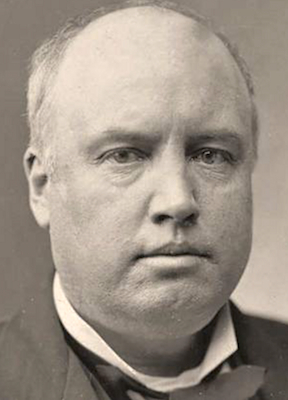On this date in 1833, “The Great Agnostic” Robert Green Ingersoll, who became the best known U.S. advocate of freethought in the 19th century, was born in Dresden, N.Y. The son of an impoverished itinerant pastor, he later recalled his formative church experiences, “The minister asked us if we knew that we all deserved to go to hell, and we all answered ‘yes.’ Then we were asked if we would be willing to go to hell if it was God’s will, and every little liar shouted ‘Yes!’ ”
He became an attorney by apprenticeship and a colonel in the Civil War, fighting in the Battle of Shiloh. In 1867, he was appointed Illinois’ first attorney general. His political career was cut short by his refusal to halt his controversial lectures, but he achieved national political fame for his thrilling nomination speech for James G. Blaine for president at the GOP national convention in 1876.
Ingersoll was good friends with three U.S. presidents and was admired by leading progressives for sentiments like this: “Who can overestimate the progress of the world if all the money wasted in superstition could be used to enlighten, elevate and civilize mankind?” (Some Mistakes of Moses, 1879.)
Ingersoll traveled the continent for 30 years, speaking to capacity audiences, once attracting 50,000 people to a lecture in Chicago. His repertoire included three- to four-hour lectures, with the largest crowds turned out to hear him denounce the bible and religion. Ingersoll’s speaking fees ranged as high as $7,000 in an era of low wages and no income tax. In 1862 he married Eva Amelia Parker, a rationalist whom he deemed a “Woman Without Superstition” in dedicating his first freethought book to her. They raised two freethinking daughters, Eva Ingersoll-Brown and Maud Ingersoll.
He initially settled in Peoria, Illinois, then in Washington, D.C., where he successfully defended falsely accused men in the “Star Route” scandal involving U.S. mail routes. The family later relocated to New York. Religious rumors against Ingersoll abounded. One had it that his son was a drunkard who more than once had to be carried away from the table. Ingersoll wrote, “It is not true that intoxicating beverages are served at my table. It is not true that my son ever was drunk. It is not true that he had to be carried away from the table. Besides, I have no son!”
The 12-volume Dresden Edition of his lectures, poetry and interviews was collected after his death and has been reprinted many times. He has been credited for reviving Thomas Paine‘s reputation in American intellectual history, which had decreased after publication of The Age of Reason in 1794-95. Ingersoll died at age 65 from congestive heart failure in Dobbs Ferry, N.Y. His ashes are interred in Arlington National Cemetery. (D. 1899)


